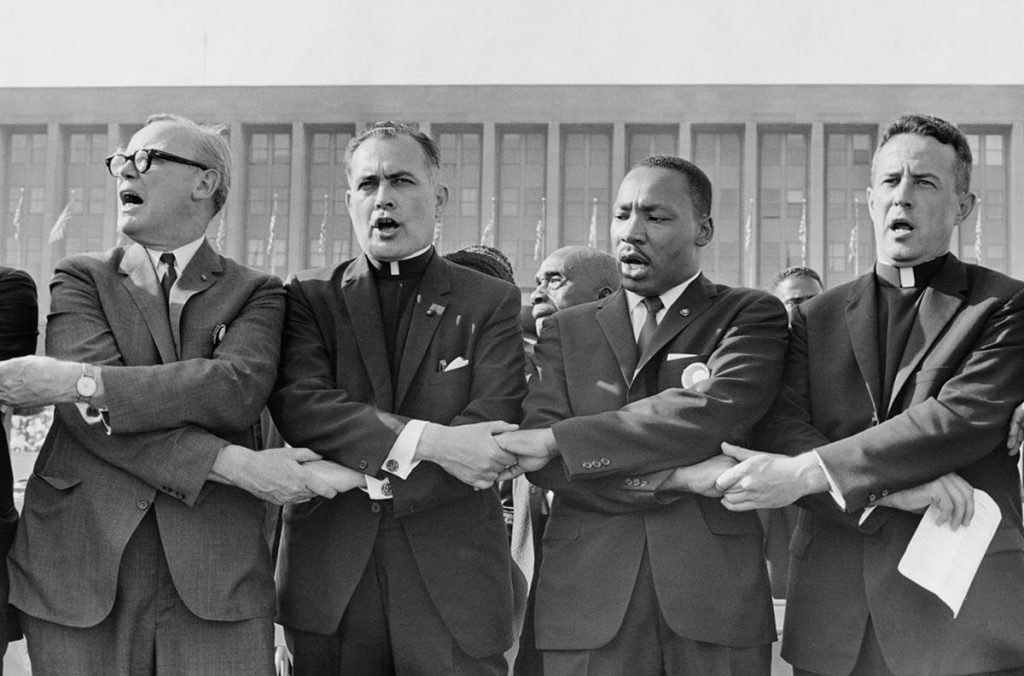The Rev. Martin Luther King dreamed of what he called “the beloved community.”
This expression inspires me in my ministry.
It is a beautiful image of the kingdom that Jesus proclaimed and called us to establish — a city of love and truth; the family of God made up of all the rich diversity of peoples from every nation.
The Rev. King’s beloved community reminds us also that America’s ideals and institutions are rooted in the Christian truth that all men and women are created in the image of God, with equal dignity and equal rights.
As we prepare for our nation’s annual memorial in honor of the Rev. King, we are painfully aware that our nation is still a long way from this beloved community that he dreamed of — and gave his life for.
This last year has been marked by increased racial violence and tension in many cities and on college campuses across the country.
Sadly, too many injustices and problems in our society remain defined along racial lines.
Too many hearts and minds are still clouded by racial attitudes and presumptions of privilege based on one’s ethnicity or the color of one’s skin.
We have come a long way in this country — but we have not come nearly far enough.
America’s “original sin” was slavery and the injustices that were done to this country’s indigenous peoples. But throughout American history, exclusion and intolerance of racial and ethnic minorities have remained a persistent temptation.
The Church teaches that every structure of sin we find in society starts in the hearts of individuals. Societies don’t sin, people do. So if we are going to root out racism in our society, we need to do more than expand opportunities, reform policies and adopt new programs.
Those things are all necessary. But lasting change will require the conversion of hearts and the renewal of our minds.
The Gospel of Jesus — the Good News of the fatherhood of God — is the most radical doctrine in the history of ideas. If we really believed that God is our father and that every person is a child of God made in his image the world could be changed overnight.
But saying such things is considered “naïve” or politically “unrealistic” these days. That’s not a sign that the Gospel isn’t true; it’s a sign that our society has slipped away from its moral and spiritual foundations. It’s a sign of hardness of heart and the decline of mercy in our society.
If we profess Christ and believe his Gospel, there is absolutely no room for prejudice or feelings of superiority based on race or ethnicity — or any other “man-made” criteria.
Sometimes on the Internet and in social media, I find good Christians expressing opinions that they claim are not about race or ethnicity, but just about politics, law and order. Only God knows the human heart, but we all have to examine ourselves and guard against self-deception and self-justification.
One test we can do: we can ask ourselves if we would express the same viewpoints so boldly in the presence of our heavenly Father, or would we say the same things about a member of our own family — about our brothers or sisters, or one of our parents?
Our Christian life is a journey of conversion. None of us are “there” yet. We are all on the path, trying to follow Jesus. We have to keep working every day, as St. Paul used to say, to be “renewed in the mind of Jesus Christ.” To bring our thoughts and actions into line with his. To see the world through his eyes and to love as he loves.
The beloved community we are called to seek is a society in which we no longer see “others” — but instead see brothers and sisters. In the beloved community, there is no one who is beyond redemption or unworthy of our compassion.
We need to reject the politics of polarization that would divide our society into competing camps of “us” versus “them” or “victims” and “victimizers.”
God sees only his children and he calls his children to be merciful to one another, to suffer with those who are suffering, to work together until every person can live with dignity and freedom. And he judges us — not on our political positions — but by our love and compassion.
So this week, let’s pray for one another. Let’s pray for healing and reconciliation in our society and let’s pray especially for all those who have lost children or loved ones due to violence in our communities.
And let us ask Mary, the Mother of Fair Love, to help us live with virtue and work for justice — as we seek the moral and spiritual renewal of our society and the beloved community of her Son.
You can follow Archbishop Gomez daily via Facebook, Twitter and Instagram.

